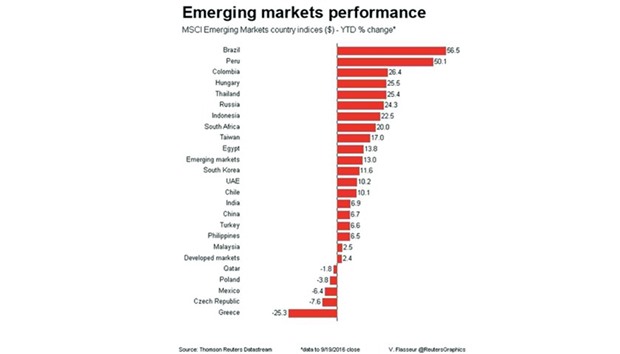Hungarian bonds made fresh gains yesterday, with short-dated yields hitting new record lows after a credit rating promotion to investment grade, while a weaker dollar saw most other emerging assets firm.
Markets are jittery before today’s meetings of the Bank of Japan and the US Federal Reserve and, while the latter is not expected to do much more than signal the timing of its next rate rise, the BoJ could cut interest rates further or announce measures to further steepen its bond yield curve.
In line with world stocks, emerging equities were flat just off one-week highs though some currencies were able to eke out gains thanks to a slight pullback in the dollar.
Jakob Christensen, head of emerging markets research at Danske Bank in Copenhagen, saw big moves as unlikely after the Fed, barring a policy surprise, but said the BoJ outcome could go either way.
“If (the BoJ) cut interest rates, the yen might weaken and pressure Asian emerging markets but on the other hand it would also signal a more relaxed monetary stance which from a carry trade perspective makes it more interesting to borrow in yen and place it in high-yielding EM currencies,” he said.
Emerging market investors were watching central bank meetings due later, with Hungary in immediate focus.
The central bank in Budapest is seen holding interest rates at 0.9% but capping the volume of money investable in short-dated three-month deposits to stimulate bank lending.
The forint was flat against the euro, holding off the 6-1/2-month highs hit after S&P Global’s move on Friday to restore Hungary’s sovereign rating back to investment grade.
Budapest stocks pulled off 9-year highs hit on Monday but bonds extended gains, with three-, and five-year yields, slipping to new record lows around at 1.22% and 1.77%.
Ten-year yields hit six-week lows around 2.78%, down 5 bps on the day.
Yields across the curve have fallen in recent days, with the three-year segment falling 26 bps since Sept 15, while five and 10-year yields are down around 20 bps.
JPMorgan said the rating upgrade could bring flows of $1bn-$1.5bn to local bonds, but added monetary easing did not appear warranted.
The rise in wage and unit labour costs could push core inflation to 3% by end-2017, the bank added.
It advised staying underweight Hungarian bonds and overweight Poland and Romania “given the higher carry offered in those markets”.
Nigeria’s central bank is also due to hold a meeting at 1430 GMT and is facing pressure to loosen monetary policy, with Finance Minister Kemi Adeosun calling for a rate cut to stimulate the moribund economy.
Economists polled by Reuters expect rates to be held at 14% even though the economy is expected to contract as inflation is running at over 17% on an annual basis.
The South African rand rose 0.7% to a one-week high against the dollar boosted also by some calming in local political tensions and Moody’s comments that the probability of a rating downgrade to junk was now less than 50%.

